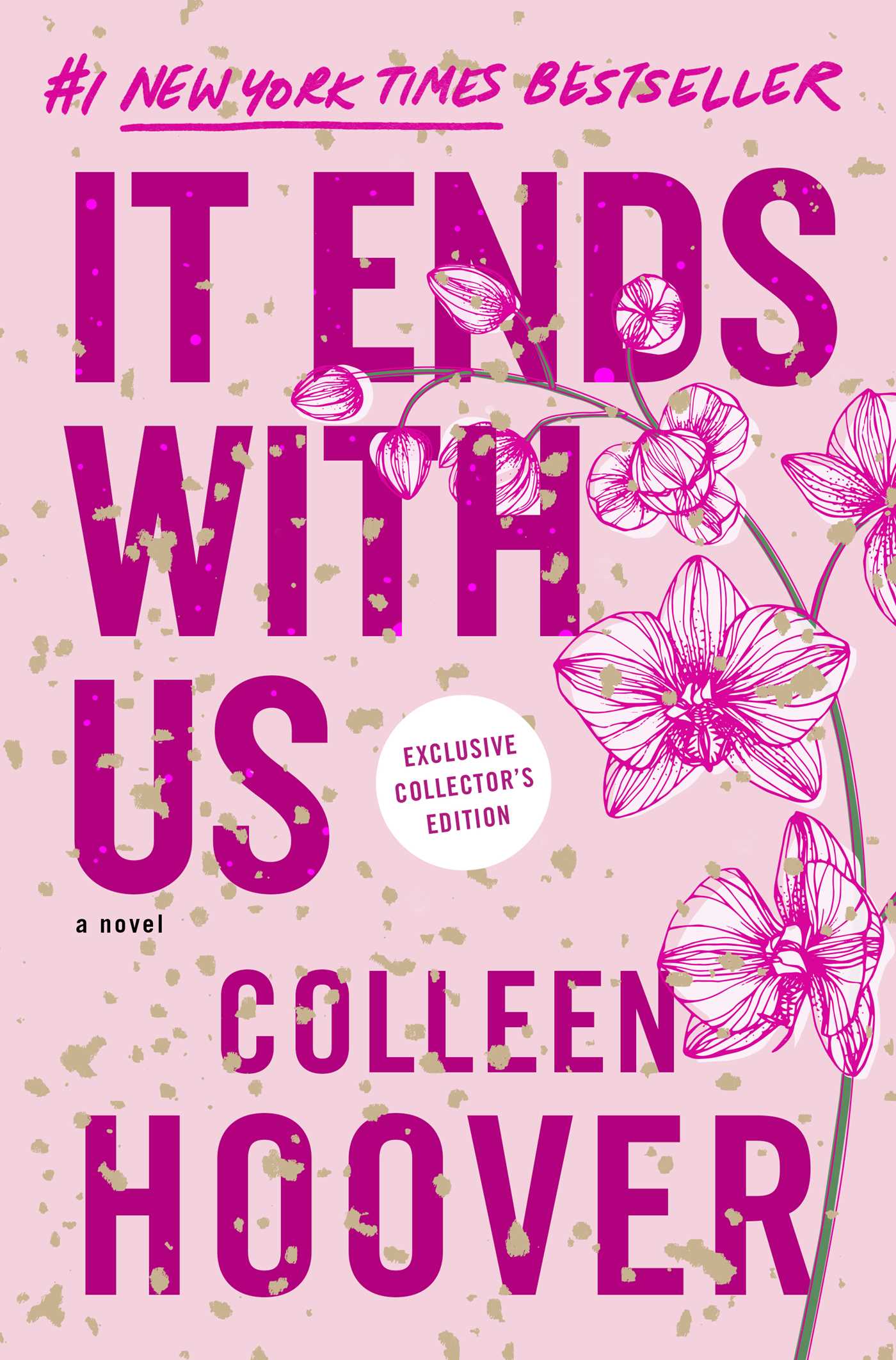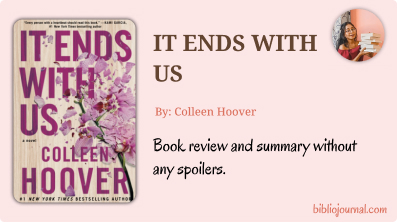It Ends With Us: A New Yorker Review
Related Articles: It Ends With Us: A New Yorker Review
Introduction
With great pleasure, we will explore the intriguing topic related to It Ends With Us: A New Yorker Review. Let’s weave interesting information and offer fresh perspectives to the readers.
Table of Content
It Ends With Us: A New Yorker Review

Colleen Hoover’s "It Ends With Us" has become a cultural phenomenon, captivating readers with its raw portrayal of love, trauma, and the enduring power of human resilience. The novel’s popularity extends beyond its compelling narrative, prompting a flurry of discussions and reviews, including a notable one published in The New Yorker.
This review, penned by Alexandra Jacobs, delves into the complexities of the novel, exploring its themes of domestic abuse, the enduring impact of childhood trauma, and the multifaceted nature of love.
A Review of "It Ends With Us" in The New Yorker
Jacobs’ review, titled "The Love That Doesn’t End," offers a nuanced perspective on "It Ends With Us." It starts by acknowledging the novel’s undeniable appeal, noting its "raw emotion, its page-turning suspense, and its vivid characters." However, Jacobs goes beyond the surface level, dissecting the narrative’s strengths and weaknesses with critical acumen.
One of the review’s key points is the exploration of the novel’s portrayal of domestic abuse. Jacobs highlights the authenticity and depth with which Hoover depicts the cyclical nature of violence, the subtle manipulation tactics employed by abusers, and the emotional turmoil experienced by victims. This, Jacobs suggests, contributes to the novel’s emotional impact and its ability to resonate with readers who have experienced or witnessed similar situations.
However, Jacobs also acknowledges the novel’s shortcomings. She critiques the oversimplification of the narrative, particularly in the portrayal of the male protagonist, Ryle. While acknowledging the novel’s intent to expose the complexities of abusive relationships, Jacobs argues that Ryle’s characterization falls short of providing a nuanced understanding of the motivations and complexities of abusers.
The review further analyzes the novel’s exploration of childhood trauma and its influence on the characters’ present-day relationships. Jacobs acknowledges the novel’s sensitivity in addressing the enduring impact of past experiences, particularly in relation to Lily’s relationship with her father. However, she critiques the lack of depth in exploring the psychological nuances of trauma and its long-term effects.
Finally, the review delves into the novel’s portrayal of love, emphasizing its multifaceted nature. Jacobs observes that "It Ends With Us" presents a realistic and nuanced view of love, showcasing its different forms, including romantic, familial, and self-love. She highlights the importance of Lily’s journey of self-discovery and her realization of her own worth, independent of external validation.
Exploring Related Searches
The New Yorker review of "It Ends With Us" has sparked a wave of interest, prompting readers to delve deeper into the novel’s themes and the author’s work. Here are some related searches that illustrate the breadth of this interest:
- Colleen Hoover Books: Readers often seek to discover other books by Colleen Hoover, eager to experience her unique style and compelling narratives.
- It Ends With Us Book Club Questions: Book clubs often choose "It Ends With Us" as a discussion topic, prompting readers to explore the novel’s themes and characters in greater depth.
- It Ends With Us Movie: With the novel’s immense popularity, there is considerable speculation about a potential film adaptation, leading to discussions about casting and potential plot changes.
- It Ends With Us Ending Explained: The novel’s ending sparks debate and interpretation, leading readers to seek explanations and alternative perspectives.
- It Ends With Us Reviews: Readers are interested in diverse perspectives on the novel, seeking reviews that offer critical analysis, personal interpretations, and comparisons to other works.
- Domestic Abuse Awareness: The novel’s sensitive portrayal of domestic abuse has led readers to explore resources and information about domestic violence, seeking to learn more about the issue and how to support victims.
- Childhood Trauma and Relationships: The novel’s exploration of the impact of childhood trauma on adult relationships prompts readers to delve deeper into the psychological effects of trauma and its influence on interpersonal dynamics.
- Self-Love and Personal Growth: Lily’s journey of self-discovery and personal growth resonates with many readers, prompting them to seek resources and inspiration for self-improvement and self-acceptance.
FAQs
Q: What is the main point of The New Yorker’s review of "It Ends With Us"?
A: The review, while acknowledging the novel’s captivating qualities, primarily focuses on critically analyzing its strengths and weaknesses. It explores the novel’s portrayal of domestic abuse, childhood trauma, and love, highlighting both its strengths in capturing authentic emotions and its limitations in providing nuanced characterization and psychological depth.
Q: What are the strengths of "It Ends With Us" according to The New Yorker review?
A: The review praises the novel’s raw emotion, page-turning suspense, vivid characters, and authentic portrayal of domestic abuse. It also acknowledges the novel’s sensitivity in addressing the enduring impact of childhood trauma and its realistic depiction of love in its various forms.
Q: What are the weaknesses of "It Ends With Us" according to The New Yorker review?
A: The review critiques the novel’s oversimplification of the narrative, particularly in the portrayal of the abusive character, Ryle. It also criticizes the lack of depth in exploring the psychological nuances of trauma and its long-term effects.
Q: What is the significance of The New Yorker’s review of "It Ends With Us"?
A: The review offers a valuable perspective on the novel, providing a critical analysis that goes beyond the surface level. It encourages readers to engage with the novel’s themes with greater depth and nuance, prompting reflection on the complexities of love, trauma, and abuse.
Tips for Reading "It Ends With Us"
- Be prepared for emotional intensity: The novel delves into sensitive topics like domestic abuse and childhood trauma, which can evoke strong emotions.
- Approach the narrative with an open mind: The novel’s portrayal of the abuser’s character may not be entirely nuanced, but it aims to capture the reality of abusive relationships.
- Engage with the themes: The novel presents an opportunity to reflect on the impact of trauma, the complexities of love, and the importance of self-love and personal growth.
- Seek additional resources: If the novel triggers personal experiences, consider seeking support from organizations dedicated to addressing domestic violence, trauma, or mental health.
Conclusion
The New Yorker’s review of "It Ends With Us" provides a valuable contribution to the ongoing conversation surrounding the novel. It offers a critical analysis that challenges readers to engage with the text beyond its surface appeal, prompting deeper reflection on its themes and the complexities of human experience. Ultimately, the review encourages readers to approach "It Ends With Us" not only as a captivating story but also as a platform for exploring important societal issues and personal growth.








Closure
Thus, we hope this article has provided valuable insights into It Ends With Us: A New Yorker Review. We thank you for taking the time to read this article. See you in our next article!